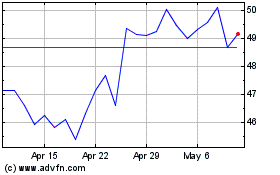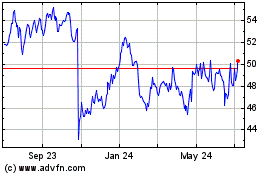Regeneron Revenue Growth Slows
November 04 2016 - 8:50AM
Dow Jones News
Regeneron Pharmaceuticals Inc. again posted double-digit revenue
growth for its key eye-disease treatment, but the company's overall
revenue grew at the slowest pace in more than four years as
concerns mount over industrywide pressures on pharmaceutical
pricing.
U.S. sales of the drug Eylea increased 16% to $854 million,
compared with $734 million in the prior-year quarter. The company
now expects Eylea to post between 23% and 25% revenue growth for
the year, raising the low end of its forecast by 3 percentage
points.
Regeneron is facing increasing pressure from health insurers
keen on keeping drug prices low.
Investors are closely watching the company's new
anti-cholesterol drug, Praluent, as it was expected to be among a
new slate of blockbusters in the giant cholesterol-control
market.
Regeneron also said it received 36% less revenue from
drug-development partner Sanofi SA, bringing in $144.4 million. It
took in less R&D cost reimbursement from Sanofi and took a
larger hit from its profit-and-loss sharing.
For the quarter ended in September, Regeneron posted a profit of
$265 million, or $2.27 on a per-share basis, up from $210 million,
or $1.82 a share a year earlier. Excluding special items, adjusted
per-share earnings were $3.13.
Revenue rose 7.3% to $1.22 billion. Analysts polled by Thomson
Reuters had expected adjusted earnings per share of $2.71 on
revenue of $1.29 billion in revenue.
In the quarter, Regeneron's research and development costs
increased 28% to $543 million.
Sales of Praluent in the latest quarter were $38 million, up
from $24 million in the previous quarter. The drug was launched in
the U.S. in the third quarter of 2015 and in certain European Union
countries in the following quarter. In July, Japan granted approval
for the drug.
Praluent, which is made by Regeneron and Sanofi, and Amgen
Inc.'s Repatha, are the only two available of a class of new
cholesterol-lowering injections blocking a protein known as PCSK9
in what Wall Street had initially thought could be as up-to-$20
billion market.
Health insurers and drug-benefit managers have steered patients
to using low-price, generic versions of statins like Lipitor, which
was once the top-selling drug in the world, instead of either of
the two drugs, which have list prices of over $14,000 a year.
Sanofi records sales of Praluent, and Regeneron shares in the
profits.
On Tuesday, Pfizer Inc. said it would halt the development of
its PCSK9 inhibitor that was in late-stage trials amid safety
concerns and mounting pricing pressures confronting the
industry.
Write to Austen Hufford at austen.hufford@wsj.com
(END) Dow Jones Newswires
November 04, 2016 08:35 ET (12:35 GMT)
Copyright (c) 2016 Dow Jones & Company, Inc.
Sanofi (NASDAQ:SNY)
Historical Stock Chart
From Mar 2024 to Apr 2024

Sanofi (NASDAQ:SNY)
Historical Stock Chart
From Apr 2023 to Apr 2024
